Why the Catholic Church Must Change
Why the Catholic Church Must Change
A Necessary Conversation
Margaret Nutting Ralph
ROWMAN & LITTLEFIELD PUBLISHERS, INC.
Lanham Boulder New York Toronto Plymouth, UK
Published by Rowman & Littlefield Publishers, Inc.
A wholly owned subsidiary of The Rowman & Littlefield Publishing Group, Inc.
4501 Forbes Boulevard, Suite 200, Lanham, Maryland 20706
www.rowman.com
10 Thornbury Road, Plymouth PL6 7PP, United Kingdom
Copyright 2013 by Rowman & Littlefield Publishers, Inc.
All rights reserved. No part of this book may be reproduced in any form or by any electronic or mechanical means, including information storage and retrieval systems, without written permission from the publisher, except by a reviewer who may quote passages in a review.
British Library Cataloguing in Publication Information Available
Library of Congress Cataloging-in-Publication Data
Ralph, Margaret Nutting.
Why the Catholic Church Must Change : a necessary conversation / Margaret Nutting Ralph.
p. cm.
ISBN 978-1-4422-2078-2 (cloth : alk. paper)ISBN 978-1-4422-2079-9 (electronic)
1. Church renewalCatholic Church. I. Title.
BX1746.R33 2013
282dc23
2012050656
 The paper used in this publication meets the minimum requirements of American National Standard for Information Sciences Permanence of Paper for Printed Library Materials, ANSI/NISO Z39.48-1992.
The paper used in this publication meets the minimum requirements of American National Standard for Information Sciences Permanence of Paper for Printed Library Materials, ANSI/NISO Z39.48-1992.
Printed in the United States of America
This book is dedicated to two valiant, faithful Catholic educators:
Sister Helen Maher Garvey, who, with five years of persistence, asked me to write this book. Some of what she taught me is discussed in chapter 5, Ordination and Womens Role in the Church.
Father Joseph Vest, who, in my last conversation with him before his sudden death, also asked me to write this book. Some of what he taught me is discussed in chapter 6, Homosexuality.
This dedication comes with my love and gratitude for your faithfulness to your vocations and your love for the Catholic Church.
Come, Holy Spirit.
Fill the hearts of your faithful.
Enkindle in us the fire of your love.
Send forth your Spirit,
and we shall be created,
and you shall renew the face of the earth.
This traditional Catholic prayer expresses the Catholic belief that we are not yet finished products but are in a process of being created. As we receive the inspiration of the Spirit, as we grow and change under the Spirits urging, we become the people we are called to be, and we participate in the renewal of the whole world.
Introduction
The title of this book, Why the Catholic Church Must Change: A Necessary Conversation, inevitably triggers a wide variety of reactions. Some Catholics feel immediate resistance because they believe that the Catholic Church cannot change its teaching on a moral matter (more about this later). They think that what the Catholic Church needs is less conversation and more submission of will and intellect to the Magisterium. (The word Magisterium,which refers to the teaching authority of the Catholic Church, has been understood differently in different centuries. In this book I use the word not to refer to the teaching role of the whole people of God or to the role of theologians, but to the role of the pope and the bishops, those who have authority by virtue of ordination and office.)
Other Catholics feel attracted to the topic. Whether they themselves are practicing Catholics (the biggest group of Christians in the United States) or fallen-away Catholics (the third-biggest group of Christians in the United States), they have family members and friends who no longer worship with the Catholic Church for a variety of reasons: they do not find the worship nourishing, they disagree with some teachings, they have been marginalized by present practices, or they have been hurt by an individual persons lack of pastoral response. They want the Catholic Church to be open to change.
Some people respond with indifference. If Catholic, they may want change, but they have no desire to join the conversation because they have no hope that change will occur. Why participate in a useless exercise? If not Catholic, they may think that the necessary conversation is one that should take place only among Catholics. Why should anyone but a Catholic care what the Catholic Church teaches?
Still others, whether Catholic or not, respond with great interest. They long for a conversation on possible changes in some Catholic teachings. They believe in the presence and power of the Spirit, inspiring disciples of Jesus Christ to be open to new knowledge and to grow in their understanding of how to continue Christs mission to the world. They recognize that Catholic teachings play a role in public policy and affect all of us. They believe that the conversation that needs to take place must not be limited to Catholics. The experience and wisdom of others must be taken into account.
As I wrote this book, I tried to keep all of these possible readers in mind. However, I myself am Catholic and am among those Catholics who believe that the Catholic Church is being called to change some of its teachings and some of its practices. I am also firmly convinced that the Catholic Church must be in conversation with other Christians and with the world at large in order to correctly discern where the Spirit is calling not just the Catholic Church, but all of Gods people.
After all, the Catholic Church is not the whole Church, not the whole body of Christ. Since Christians are called to be one in Christ, Catholics must be in dialogue with other Christians. In addition, Christians, including Catholics, live in a pluralistic society and are called to love all of Gods beloved children. Since we cannot love those whom we do not know, all of us must, by necessity, be open to conversation with people of cultures and religions different from our own, and be open to understanding Gods will for Gods people in a wider context than we may have previously understood.
Why Necessary?
Cardinal Timothy Dolan, in his November 2011 presidential address to the United States Conference of Catholic Bishops (USCCB) stated very clearly why a conversation about change in the Catholic Church is absolutely necessary. Then archbishop Dolan exhorted his fellow bishops to remember that love for Jesus and His Church must be the passion of our lives. He then went on to say:
Perhaps, brethren, our most pressing pastoral challenge today is to reclaim that truth, to restore the luster, the credibility, the beauty of the Church ever ancient, ever new, renewing her as the face of Jesus, just as he is the face of God. Maybe our most urgent pastoral priority is to lead our people to see, meet, hear and embrace anew Jesus in and through His Church.
Because, as the chilling statistics we cannot ignore tell us, fewer and fewer of our beloved peopleto say nothing about those outside the household of faithare convinced that Jesus and his Church are one.
Some of the chilling statistics to which Cardinal Dolan refers have been provided to us by the U.S. Religious Landscape Survey of the Pew Research Centers Forum on Religion and Public Life. This research tells us that one out of every three people raised Catholic in the United States no longer identifies himself or herself as Catholic.
If the U.S. bishops, not to mention the whole Magisterium, want to understand and reverse the reasons for this exodus, they must be in conversation with those who have left. The credibility of the Catholic Church will not be reclaimed unless the Catholic Church opens itself up to conversation and possible change.
Next page
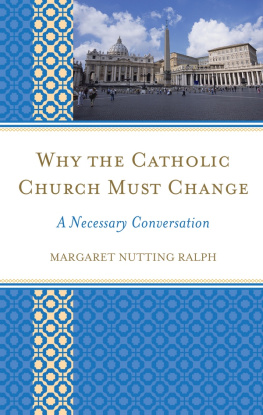


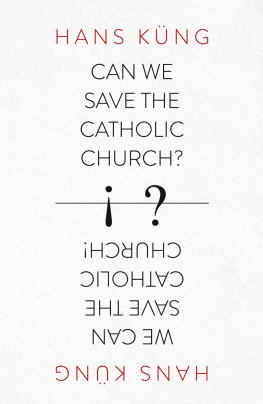
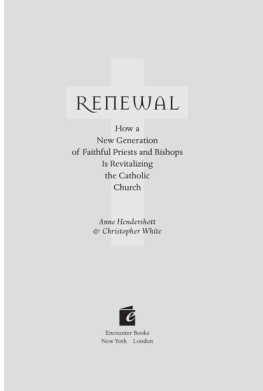
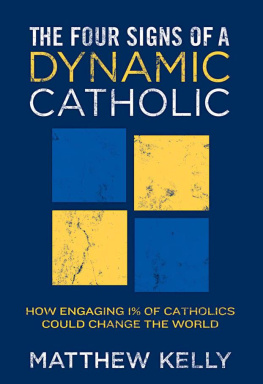
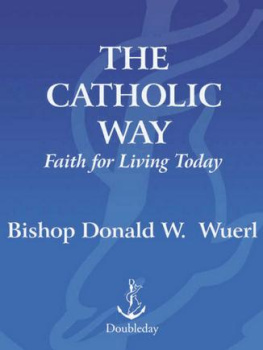

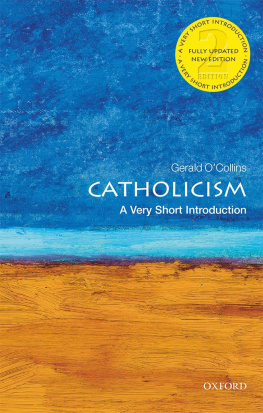
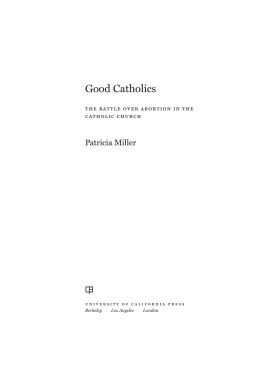
 The paper used in this publication meets the minimum requirements of American National Standard for Information Sciences Permanence of Paper for Printed Library Materials, ANSI/NISO Z39.48-1992.
The paper used in this publication meets the minimum requirements of American National Standard for Information Sciences Permanence of Paper for Printed Library Materials, ANSI/NISO Z39.48-1992.